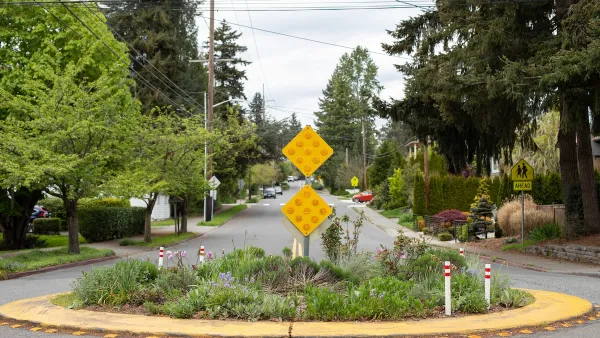Launched with neighborhood-friendly ambitions, Chicago's people plaza program was meant to create revenue-generating gathering places. A Chicago Tribune editorial says it's hard to find any people at the plazas, however.

The Chicago Tribune's editorial board revisits the "people plazas" ideas put forward by Mayor Rahm Emanuel as a way to reinvigorate vacant city-owned lots. The ideas as to create live music venues and art exhibits, and offer a place to "gather, mingle, shop at pop-up stores, dance even" in residential neighborhoods.
The editorial board offers a blunt assessment of the people plazas program, however: "Almost two years later, there's something missing from the people plazas. People." The editorial provides more background on how the program was meant to launch and operate:
The program was supposed to transform 49 pieces of vacant or underused city-owned land into gathering places "that reflect the unique and dynamic cultures of the various neighborhoods," according to the city's bidding documents. The hope was that the plazas would eventually become self-sustaining — companies would be permitted to advertise at the plazas, as well as sell food or merchandise. The city would get a 10 percent cut of the net profits, and the company hired to make the people plaza project happen, Latent Design, would get the rest.
The Tribune has found no evidence that the program has achieved even middling success. So far the city has spent $164,000 on the program while raising only $8,000 in revenue. The editorial thus suggests that both the Mayor's Office and the alderman with people plazas in their districts apply more pressure for results.
[Ed's note: the Tribune says the people plaza program was launched in 2015, but we see evidence of the term dating back to 2013.]
FULL STORY: Chicago's unpopulated 'people plazas'

Planetizen Federal Action Tracker
A weekly monitor of how Trump’s orders and actions are impacting planners and planning in America.

Chicago’s Ghost Rails
Just beneath the surface of the modern city lie the remnants of its expansive early 20th-century streetcar system.

Amtrak Cutting Jobs, Funding to High-Speed Rail
The agency plans to cut 10 percent of its workforce and has confirmed it will not fund new high-speed rail projects.

Ohio Forces Data Centers to Prepay for Power
Utilities are calling on states to hold data center operators responsible for new energy demands to prevent leaving consumers on the hook for their bills.

MARTA CEO Steps Down Amid Citizenship Concerns
MARTA’s board announced Thursday that its chief, who is from Canada, is resigning due to questions about his immigration status.

Silicon Valley ‘Bike Superhighway’ Awarded $14M State Grant
A Caltrans grant brings the 10-mile Central Bikeway project connecting Santa Clara and East San Jose closer to fruition.
Urban Design for Planners 1: Software Tools
This six-course series explores essential urban design concepts using open source software and equips planners with the tools they need to participate fully in the urban design process.
Planning for Universal Design
Learn the tools for implementing Universal Design in planning regulations.
Caltrans
City of Fort Worth
Mpact (founded as Rail~Volution)
City of Camden Redevelopment Agency
City of Astoria
City of Portland
City of Laramie




























